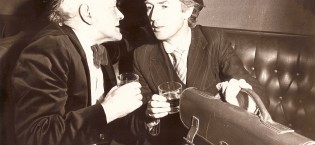“God’s Gentry” – A Critical Appreciation
 The unusual either excites or disappoints, fascinates or repels. Frequently it does all these. “God’s Gentry” by Donagh Mc Donagh which was presented by the Sligo Drama Circle is unusual, and it had in some measure, all these effects but in greatest measure it had fascination. From the beginning to the end of the play the action, language, and situations are truly fascinating. One leaves the theatre refreshed and delighted, amused and somewhat irritated, but more than anything else, satisfied that the frolic was well worth while. The play is as light as a wisp of summer cloud high over Croagh Partick and as gay in movement as a dancing stream down the side of Nephin. To present such lightness and movement, without losing any of their magic, is a difficult task and for the amateur producer a most formidable one. The Drama Circle’s producer faced his task bravely and his production was, on the whole, highly successful.
The unusual either excites or disappoints, fascinates or repels. Frequently it does all these. “God’s Gentry” by Donagh Mc Donagh which was presented by the Sligo Drama Circle is unusual, and it had in some measure, all these effects but in greatest measure it had fascination. From the beginning to the end of the play the action, language, and situations are truly fascinating. One leaves the theatre refreshed and delighted, amused and somewhat irritated, but more than anything else, satisfied that the frolic was well worth while. The play is as light as a wisp of summer cloud high over Croagh Partick and as gay in movement as a dancing stream down the side of Nephin. To present such lightness and movement, without losing any of their magic, is a difficult task and for the amateur producer a most formidable one. The Drama Circle’s producer faced his task bravely and his production was, on the whole, highly successful.
It looked, when the play began, as if the stage were too small for all the swirling figures, but by good and pleasing grouping the producer overcame, to a large extent, the limitations placed on his large cast by the restricted space. The lighting shoed some lack of careful planning and imaginative treatment. It would have been much more sensible of Nora Melody to have lighted a candle in her room, for at least its rays would not have fallen onto the backdrop which was sky and mountain. They might have had some chance, if properly directed, of falling on the ground or of shining in the direction the window faced. It was more than strange too, that with the exception of a bit of darkening of the background, the light stayed constant during most of Acts I and II though many hours of evening elapsed. Certainly it was St. John’s Eve, and it may have been bright ’till very late, but it would have added greatly to the production if dramatic lighting had been introduced here. Balor should, on arrival, surely have got the spotlight for a while. He deserved it anyway.
A very special word of praise to the producer for such wonderful tinkers’ women. They were as tousled and gaudy a bevy as ever roamed a fair. They were gay and dangerous and Molly Ward set a splendid example of the best in tinkers’ women’s behaviour. Joan Burnside made Meg Ward a delightful tinker. She looked bewitching, acted very well and sang with captivating charm. Her performance in Act III was one of the highlights of the evening. Marie Mulvihill, as Betsy Connors, had what is really the only melodramatic part in the play and, having the audience’s sympathy, she should have played on it more. She played the part with forceful intelligence but could have broadened the pathetic aspect of it. As father of many tinkers, Eddie Mc Dermottroe gave the necessary vigour to the part of Adolph. He appeared to have captured the full spirit of the frolic, as his gesturing seemed to invite the audience to participate in his wickedness.
The tinker band was good but their efforts were completely overshadowed by one of themselves. Brian Bohan as Larry gave one of the best performances of the evening. In a play where sincerity counted little, his reading of the part was truly sincere and he showed this in voce and gesture. One poor tinker lost his bearings completely. In Act III in particular his performance, unless it was the producer’s fault, was like something out of “West Side Story” that had rambled into “Moulin Rouge” and got to Mayo little by little. Eddie Fitzpatrick, as Marks Mongan, was very good indeed. He looked like a tinker, moved like a tinker and most of the time spoke like a tinker. Occasionally in his scenes with Nora, his voice had a ring of genuine sincerity – not tinker sincerity – which was out of character. This was the only major flaw in what was the finest characterisation in the presentation.
The respectable Melody family were highly respectable and acted with the assurance and dignity hat became their station. Their daughter Nora (Monica Toher) gave a grand performance. She spoke well, moved gracefully and came down the ladder with the minimum of fuss. Perhaps the changes of accent of Sergeant Dethe (Joe Mc Morrow) were symbolical. They may have meant to convey how universal is the scope of the law in Ireland, stretching from Cork to Donegal! George O’ Donnell as Guard Bansha, was very funny and said the little given to him with mournful humour. The music played by Andy Barry enlivened the action of the production.
from The Sligo Champion, by Tadhg Glenanne, February 28th, 1959
Tags: Donagh Mc Donagh, History, Press Reports, Reviews








